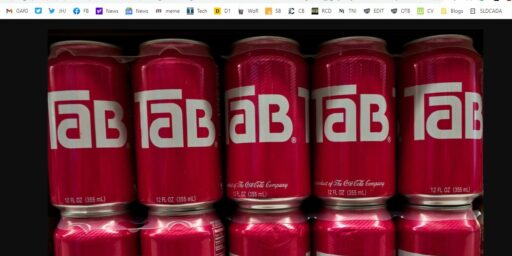Patagonia, Nonprofits, and the Tax Code
A sweet story gets a wee bit more complicated.

In yesterday’s tab clearing, I pointed to the NYT report “Billionaire No More: Patagonia Founder Gives Away the Company.” The lede:
A half century after founding the outdoor apparel maker Patagonia, Yvon Chouinard, the eccentric rock climber who became a reluctant billionaire with his unconventional spin on capitalism, has given the company away.
Rather than selling the company or taking it public, Mr. Chouinard, his wife and two adult children have transferred their ownership of Patagonia, valued at about $3 billion, to a specially designed trust and a nonprofit organization. They were created to preserve the company’s independence and ensure that all of its profits — some $100 million a year — are used to combat climate change and protect undeveloped land around the globe.
The unusual move comes at a moment of growing scrutiny for billionaires and corporations, whose rhetoric about making the world a better place is often overshadowed by their contributions to the very problems they claim to want to solve.
At the same time, Mr. Chouinard’s relinquishment of the family fortune is in keeping with his longstanding disregard for business norms, and his lifelong love for the environment.
“Hopefully this will influence a new form of capitalism that doesn’t end up with a few rich people and a bunch of poor people,” Mr. Chouinard, 83, said in an exclusive interview. “We are going to give away the maximum amount of money to people who are actively working on saving this planet.”
The report also notes,
The trust, which will be overseen by members of the family and their closest advisers, is intended to ensure that Patagonia makes good on its commitment to run a socially responsible business and give away its profits. Because the Chouinards donated their shares to a trust, the family will pay about $17.5 million in taxes on the gift.
The Chouinards then donated the other 98 percent of Patagonia, its common shares, to a newly established nonprofit organization called the Holdfast Collective, which will now be the recipient of all the company’s profits and use the funds to combat climate change. Because the Holdfast Collective is a 501(c)(4), which allows it to make unlimited political contributions, the family received no tax benefit for its donation.
“There was a meaningful cost to them doing it, but it was a cost they were willing to bear to ensure that this company stays true to their principles,” said Dan Mosley, a partner at BDT & Co., a merchant bank that works with ultrawealthy individuals including Warren Buffett, and who helped Patagonia design the new structure. “And they didn’t get a charitable deduction for it. There is no tax benefit here whatsoever.”
Somewhat confused by the whole thing, I mused that it was “An interesting if odd way to do philanthropy.”
A follow-up report from Bloomberg News (“Patagonia Billionaire Who Gave Up Company Skirts $700 Million Tax Hit“) makes it all much clearer. Rather than an act of extraordinary philanthropy at great personal cost, it portrays something far more calculated.
Patagonia founder Yvon Chouinard described his decision to give away the outdoor apparel-maker as his last-ditch effort to do all he could to protect the planet.
The deal is structured in ways that also bring the billionaire other perks, by letting him and his family keep control of Patagonia while shielding them from tax bills that could have totaled hundreds of millions of dollars.
By donating most of the company, which is valued at $3 billion according to the New York Times, Chouinard is at the fore of a small-but-growing movement among the ultra-wealthy to use nonprofits to exert political influence long past their lifetimes.
Wait a minute. He didn’t actually give away the company?
While many billionaires make living donations with tax and estate planning as the primary considerations, Chouinard seems to have structured his Patagonia transfer with at least a few purposes in mind. Holdfast is a 501(c)(4), a nonprofit that can make unlimited political donations — unlike its cousin, the 501(c)(3). For that reason, any giving to a 501(c)(4) isn’t eligible for income-tax deductions. In addition, the Patagonia founder will owe $17.5 million in gift taxes for the shares he transferred to the trust.
Still, the moves mean Chouinard won’t have to pay the federal capital gains taxes he would have owed had he sold the company, an option he said was under consideration. On a $3 billion sale, that bill could be more than $700 million. It also helps Chouinard avoid the US estate and gift tax, which is a 40% levy on large fortunes when they’re transferred to heirs.
And, rather than generously absorbing a $17.5 million tax hit for something it didn’t actually give away, the family is actually saving $700 million in estate taxes! That makes more sense.
His nonprofit is still going to spend a lot of money in service of a good cause, albeit perhaps through political intervention rather than scientific discovery. So that’s good at least.
“We are letting people opt out of supporting all the expenses of government to do whatever they want with their money,” said Ray Madoff, a professor at Boston College Law School. ”This is highly problematic from the point of view of democracy, and it can mean a higher tax burden for the rest of Americans.”
Let’s address the second point first: it doesn’t really work that way. Our tax system is overly complicated and has too many loopholes and giveaways. But it’s not like we decide what to spend and then divvy up the costs. Or even that we were counting on Chouinard kicking the bucket so that we could rake in that sweet $700 mil.
As to the first, yes, there’s something rather odd at the Bill Gateses of the world having massive fortunes in so-called nonprofit entities that allow them to rather profoundly shape public policy. While there’s an argument that they’re more efficient than any government bureaucracy would be, it’s also perfectly reasonable to argue that the people’s elected representatives should make decisions about how scarce resources are allocated against the various problems we face as a country, much less as a planet.






Saw this counter-take yesterday and I just don’t get it.
Yes, they are avoiding $700 Million in estate taxes BUT they are also giving up the profits from Patagonia ($100 Million a year currently) forever.
Yes, they will retain control BUT they are giving up the income stream.
I expect the details are different, but this sounds a lot like Barre Seid donating his company to a foundation. Except Chouinard seems to be trying to do some good with the money while bypassing government while Seid, in giving the money to Leonard Leo, is doing evil and attacking democratic government. We really need the Eisenhower era top marginal rate back.
@SKI:
This is an extremely cynical take, James, almost every type of donation involves a degree of tax avoidance. The key is that they could’ve taken home $2.3 billion from selling the company or held onto it and profited tremendously on an annual basis.
I’m no fan of the billionaire foundations, I’ve known people working at the Gates Foundation and HHMI my personal view is that while their goals are positive, these types of organizations usually become bizarre institutions beholden to no one. None of them are as efficient as most government organizations, the best of them do nice work, the worst are country clubs run for the benefit of the founders and their offspring and friends.
Here in San Antonio a local businessman, John Santikos, gave his entire business to a local charitable foundation. He died in 2014 and the business (movie theaters and real estate) was about $600M. It was a successful and generous move but it puts the charity in the position of managing a business which is not exactly its core competency. And real estate is not the most liquid of assets.
But none of this seems to be new. It’s why we have the Ford, Carnegie, and Rockefeller Foundations still around a century after the money was made. As will the Gates Foundation 100 years from now.
I’m not seeing the issue here.
The family passed up the chance to get a $2.3B after taxes, actually paid taxes for giving a gift, and endowed a non-profit that’s dedicated to solving (or at least mitigating) one of the biggest issues we have.
$100M/year going to fighting climate change–for scores of years to come–vs. $700M to the government, once–with zero knowledge of what that money will be used for.
@Mu Yixiao: Yes, the Patagonia foundation, assuming it doesn’t become corrupted, will do good. But the issue is also about Barre Seid, as I mentioned above @gVOR08:, and the Scaife Foundation, and the Bradley Foundation, and gawd knows how many more that are carrying on their founders’ crank prejudices in perpetuity.
Mitch McConnell? Lindsay Graham? Ted Cruz? These are the kinds of people you want making decisions about the fate of the planet? REALLY????
@Just nutha ignint cracker:
I was going to use Trump himself and the Cabinet members he appointed. Trump’s idea of being a steward of the environment was to appoint Cabinet members such as Zinke that instead of embracing his role as an individual who could halt any push to open up Federal lands and National parks to more resource extraction wanted to give away all the oil and gas in places like Utah’s parks, Yellowstone, etc., to corporations.
Zinke probably has a flag pennant on his bedroom wall that says drill baby, drill! THIS is the type of person we can expect Trump to appoint again as the Secretary of the Interior, and this is supposed to give me hope that a certain political party in this country will be better stewards of places like national parks or advocates for cleaner energy sources, why?
Not all corporations are completely evil, and I have to say I am fairly non=plussed that us taxpayers are not getting 700 million from Patagonia if in the long run we end up getting over 1 billion over the course of 10+ years to fight climate change.
There are real problems with business inheritance in this country that tend to get confused with all other estate tax issues but should be thought of separately. I’m aware of a local manufacturing company that employed a couple hundred people founded in the 1940’s and when the owner died the estate tax hit simply forced the company to close and sell off its physical property. Oh I suppose they could have taken out a massive loan and paid interest on it for decades. They were in a good position before the death-no debt. And profitable. But manufacturing companies in the US today, especially subcontractors to the big auto and aerospace companies, are run with depressingly thin profit margins. In the end everyone lost their (good paying union) jobs.
Yes, I’m aware the line between personal property and business property can get awfully confused. It needs to be better defined, and business property allowed to move on with much lower-possibly even no, estate tax issues.
@inhumans99: I would have to, but Dr. Joyner specifically said “elected representatives,” so I went that way to avoid “well sure, but I said elected representatives not unelected cabinet people.”
@Just Another Ex-Republican:
Why? If you have retained your company as a personal asset then why shouldn’t it be treated as a personal asset?
@MarkedMan: I should probably expand on that. I know a specific person who has built up a significant business over the course of 50 years. About 150 employees, multiple buildings that he owns, fleets of trucks, etc. In all that time he never treated it as a corporation that would outlast him. Don’t get me wrong, he wants that, desperately so now that he can see the end is coming. But he never treated it that way. He gave significant shares to relatives, and more to his children as gifts. Sure, they worked for a time in the business but didn’t really contribute in a significant way, and of course he didn’t do this for non-family. He just never made any significant attempt to position it as a self perpetuating enterprise until about 15 years ago it dawned on him that the circumstances of his family were such that when he died they were going to sell it off and divide up the money. Inheritance taxes is a big part of that, because he didn’t structure the business to protect it from that. But with a determined team of professionals they could have prepared for it. But at this point there are too many third generation kids and ex-wives that just want to cash out, want nothing to do with this business they partially own, that once he is gone it’s over. He blames it all on the government and “death taxes” but in the end if you treat your business like a personal asset that’s the way it will be dealt with in probate, and that’s fair.
@MarkedMan: Consider the following: when my mother died a few years ago my sister and I inherited her townhome, purchased way back in 1980. We were nowhere near the estate tax exemption (I wish!) so we owed no tax on it. In fact, we were allowed to step up the cost basis to the current market value (which was a pretty large increase). When we sold the townhome a couple years later we had to pay tax but only on the value increase from when we acquired it, not since Mom bought it decades ago. (if anyone doesn’t understand what I’m getting at here google inherited home cost basis or similar for detailed examples of how this works)
Compare to the business in your example, or a good sized farm or ranch. When they die the exemption doesn’t come close to covering the value and they have an immediate and heavy tax bill, based on the estimated value of the property (and extremely limited step-up cost basis as well). When that happens it can be devastating. A farmer’s family has to sell off land that they’ve owned for decades, and Big Ag gets bigger. A family sells off assets like trucks piecemeal because they want to try and keep things going but they are now smaller and have to downsize people as well. They take out a huge loan to pay the tax and the business is potentially crippled as if a leveraged buyout had happened. They manage to get it into some sort of trust or charity and now the business is run by people who have no real idea what they are doing or any real interest in it, which never ends well. Or they just sell it off and what was a family owned small business dies or is absorbed into some other company (and here come the layoffs). When you are dealing with a business, it’s not just the heirs you are dealing with, its everyone that business employed who risks being badly impacted through no fault of their own.
And yes, with an army of determined professional lawyers and accountants you can protect the business. But that takes years of effort and is not cheap (for either the team expertise you have to hire or the amount you pay as the founder’s ownership stake is folded into the business itself; you can’t just sell the business to the Board of Directors for a buck even if you want to).
I guess what I meant in my first comment is that I honestly feel it should be easier to allow true business assets to be passed on without necessarily any tax at all. Why is there a limit? Like with my mom’s house you can and will pay taxes when you sell-which it sounds like the family in your example wants to do. But note they will be paying both the inheritance tax AND income tax on whatever they sell it for. For a business like you described you can probably expect about 80% of the sale price to get sucked into one of those taxes. I can understand why that upsets people!
Now the trick of course is making sure truly personal assets like homes, cars, investment accounts, etc are not hidden or mixed in with the business assets. And I would like to see far stronger regulation and controls on businesses paying for personal expenses for owners and executives too–I would not only charge an income tax on the expense for that, but add markup to make it even more expensive than just paying the damn salary and letting the individual deal with it. And then add serious financial and even criminal penalties for violations. But true business assets? Eh-if the family wants to sell like they do in your example, they’ll be paying top tax rates anyway. I’d prefer for it to be far simpler than it is today for the heirs to keep the business going though because it’s better for everyone they employ and the community around them. Without forcing debt, or piecemeal sales, or completely new ownership just to pay a very sudden, all too often unexpected, and heavy tax bill.